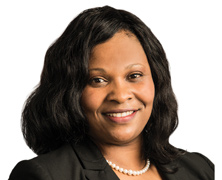When I was younger I thought I was smart, but I still watched while other people were given opportunities I wanted. I continued my education, got leadership training, and participated in professional conferences—and still the opportunities didn’t develop. I couldn’t understand how to turn potential energy or talent into the kinetic energy that would result in leadership opportunities.
Self-confidence was an obstacle for me. We live in a world where women and ethnic minorities are often made to feel we are not good enough. The reality is that it can be difficult to fit in because an organization’s culture does not always match who you are.
About ten years ago, I decided to be my authentic self. That has given me the freedom to perform my job without needing to defend or explain myself. Meanwhile, I looked for opportunities and work environments that stretched me and gave me different experiences—like Walden University, where I now am associate dean and manage other educators.
This increased responsibility allowed me to think about what I’ve learned from leadership. I chose to be a leader who affirms other people, who makes them know that they are respected and I’m interested in their individual talents. I realized I am stronger if I surround myself with intelligent and talented people and encourage them to come to me with ideas.
My leadership style is collaborative. I usually try to gather other team members’ input before I make big decisions, but I know my role and responsibility in the decision-making process. Something my mother shared with me has carried me through life: People want to feel like they matter. Whatever they are experiencing is relevant and important.
I’ve also become comfortable being a mentor. I realize that people want to benefit from my experience and it’s important to impart what I’ve learned. When you are an African American woman in a professional environment, there are not many mentors and role models with the same cultural experiences or perceptions of the world of work, so it is important to share.
The most important lesson I’ve learned is not to fear making mistakes. As you move through your career, mistakes will seem to cost more. You become stagnant if you do not take a risk or try something new. Most successful people will tell you that they’ve had failures too numerous to count. You need the courage to try.
How has education affected your career?
Education has allowed me to express myself and be heard. It has enabled me to pursue work I like, customize it in ways I never imagined, and apply my natural abilities.
What does it take to succeed and stay competitive in your position/field?
Stay current with trends and changes. Staying relevant means continuing to be educated and trained.
Is there a role model who has had a profound impact on your career and/or life? What did he/she motivate you to do?
My grandparents and my parents provided a foundation that has sustained me regardless of my professional environment. They loved me unconditionally. They gave me a strong work ethic and taught me to do my best and do it in a way I can respect myself.








I was so moved by your story and I, too, have found myself aspiring to become who I was created to be. Thank you, you give me hope!